|
|
2009/2010 ARMADA Master Teachers
- Beth Brocato- Exeter-West Greenwich Junior High (West Greenwich, RI)
- Jennifer Duncan- Madeira Beach Fundamental School (Madeira Beach, FL)
- Jennifer Emblidge- Marblehead High School, Marblehead, MA)
- Teresa Gable- Seneca Falls Middle School (Seneca Falls, NY)
- Jonathan Pazol- West Leyden High School (Northlake, IL)
- Daphne Rawlinson- West University Elementary (Houston, TX)
- Aundrea Rue- Carolina Forest High School (Myrtle Beach, SC)
- Jacqui Smoler- Jacqui Smoler, St. Peter's College (Adelaide, South Australia)
- David Wehunt- Soddy Daisy High School (Soddy Daisy, TN)
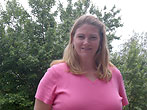 Hi! I'm Beth Brocato. I have been teaching 7th and 8th grade science at Exeter-West Greenwich Junior High School in West Greenwich, Rhode Island for the past 17 years. I am our school's Improvement Team chairperson and I serve on the district Professional Development Committee. I also spend a few weeks of my summer training teachers on integrating technology into their classrooms through the Rhode Island Teachers and Technology Initiative. I truly enjoy working with adolescents and appreciate all the enthusiasm for learning that they bring to school with them each and every day. I hope my participation in the ARMADA Project will help make some real-world connections for my students as well as to instill my love for life-long learning. Besides teaching, I enjoy traveling with my husband and my daughter, Leah. I also play golf and spend a good part of the summer at the lovely Rhode Island coastline. Hi! I'm Beth Brocato. I have been teaching 7th and 8th grade science at Exeter-West Greenwich Junior High School in West Greenwich, Rhode Island for the past 17 years. I am our school's Improvement Team chairperson and I serve on the district Professional Development Committee. I also spend a few weeks of my summer training teachers on integrating technology into their classrooms through the Rhode Island Teachers and Technology Initiative. I truly enjoy working with adolescents and appreciate all the enthusiasm for learning that they bring to school with them each and every day. I hope my participation in the ARMADA Project will help make some real-world connections for my students as well as to instill my love for life-long learning. Besides teaching, I enjoy traveling with my husband and my daughter, Leah. I also play golf and spend a good part of the summer at the lovely Rhode Island coastline.
 My name is Jennifer Duncan and I currently teach marine science at Madeira Beach Middle Fundamental School in St. Petersburg, Florida. This is a marine theme school that is located on the diverse and plentiful Boca Ciega Bay. This gives us the unique ability to perform hands-on on-site skills such as seining, casting, fishing, and plankton tows, to more challenging field collection studies from our docks, mangrove trail, and beach. I fell in love with ocean sailing along the Jersey Shore when I was a little girl. Following my goal to become a marine biologist I received a bachelor's degree at Eckerd College and a master's degree at University of South Florida. My name is Jennifer Duncan and I currently teach marine science at Madeira Beach Middle Fundamental School in St. Petersburg, Florida. This is a marine theme school that is located on the diverse and plentiful Boca Ciega Bay. This gives us the unique ability to perform hands-on on-site skills such as seining, casting, fishing, and plankton tows, to more challenging field collection studies from our docks, mangrove trail, and beach. I fell in love with ocean sailing along the Jersey Shore when I was a little girl. Following my goal to become a marine biologist I received a bachelor's degree at Eckerd College and a master's degree at University of South Florida.
My thesis focused on marine biomedical research working in conjunction with Harbor Branch Oceanographic Institute and mentored by Dr. Amy Wright. This research study led to our patent and publication in "Biochemical Pharmacology" and "The Journal of Marine Education." Prior to teaching in the classroom I worked aboard Geronimo, a sailing vessel based out of St. George's School in Middletown, Rhode Island.
Sharing these marine experiences, adventures, and discoveries is what I enjoy most about my nine years of teaching. The ARMADA Project will be an enlightening and current experience to enhance my curriculum and ultimately the students' interest.
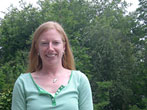 My name is Jennifer Emblidge. I teach science at Marblehead High School in Marblehead, Massachusetts. Currently, I am teaching freshman biology and a marine science elective course. I also coach our school's ocean science team, cross-country running team, and track team. I enjoy working with students because it gives me the opportunity to share, pass on, and develop my passions in life. I have taught for the past five years during which I earned my education degree from Providence College in Rhode Island. Previous to that, I was earning my master's degree in marine biology from the College of Charleston in South Carolina. My name is Jennifer Emblidge. I teach science at Marblehead High School in Marblehead, Massachusetts. Currently, I am teaching freshman biology and a marine science elective course. I also coach our school's ocean science team, cross-country running team, and track team. I enjoy working with students because it gives me the opportunity to share, pass on, and develop my passions in life. I have taught for the past five years during which I earned my education degree from Providence College in Rhode Island. Previous to that, I was earning my master's degree in marine biology from the College of Charleston in South Carolina.
I am a competitive runner and triathlete. I enjoy many activities that involve the outdoors such as camping, kayaking, and hiking. I have had an admiration for the ocean for as long as I can remember and I am continuously finding ways to make it an active part of my life. I see the ARMADA Project as a very valuable experience for both me and my students. I am very excited to become a part of a marine research project again. My excitement is infectious and spreads throughout my classroom, which will allow my students to share in this research experience as well. I am looking forward to exploring the many ways that my students can get involved with my ARMADA research experience.
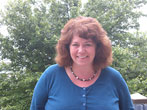 My name is Teresa Gable and I teach life science at the Seneca Falls Middle School in Seneca Falls, New York. I also teach the accelerated science program to the advanced students. My name is Teresa Gable and I teach life science at the Seneca Falls Middle School in Seneca Falls, New York. I also teach the accelerated science program to the advanced students.
I grew up in Massachusetts and I love the ocean environment. I enjoy walking on the beach and looking for treasures. Water quality is important to me. My major in college was environmental sciences with a concentration in water quality issues. I received my degree from the University of Massachusetts Amherst. I also enjoy kayaking, SCUBA diving, and other water sports and activities.
I am looking forward to participating in the ARMADA Project this summer. I believe that it is important to continue to learn throughout the summer and change my curriculum and add new lessons every year. It keeps me motivated and enthusiastic. I am especially interested in participating in a real research expedition and be a part of the experience.
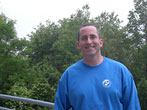 My name is Jon Pazol, and I have been a teacher at West Leyden High School in Northlake, Illinois for 20 years. The Leyden School District includes communities that surround O'Hare Airport, and we serve a very diverse student population. I currently teach biology and AP biology, but have a background in chemistry, environmental studies, field ecology, and physics. My name is Jon Pazol, and I have been a teacher at West Leyden High School in Northlake, Illinois for 20 years. The Leyden School District includes communities that surround O'Hare Airport, and we serve a very diverse student population. I currently teach biology and AP biology, but have a background in chemistry, environmental studies, field ecology, and physics.
I recently returned to the lab for the first time since college. I spent two summers at the Nanoscale Science and Engineering Center at Northwestern University performing nanotechnology research in a chemical engineering lab. Being able to actually "do science" was highly enriching and motivated me to explore other such opportunities, which is how I came to the ARMADA Project.
Because I grew up in the Midwest, went to college here and teach here, I have limited first-hand experience in oceanography, as do most of my students. Many of them come from ranches in Mexico and have never seen the ocean, or even been in Lake Michigan, which is less than 15 miles away. My goals for the ARMADA Project are to gain personal experience in oceanography and to further broaden my research capabilities. I am very excited to be traveling aboard the U.S. Coast Guard icebreaker Healy doing sea floor mapping and other arctic research. When I asked for an "adventure," this is exactly what I had in mind.
When I am not teaching, sponsoring activities, or doing Union work, I enjoy spending time with my family (wife, two kids, two dogs), hiking, biking, and going to hear live blues music.
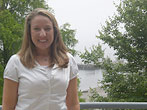 Hello, I'm Daphne Rawlinson. I have been teaching 3rd - 5th grade science at J. Will Jones Elementary in the Houston Independent School District for the past three years. J. Will Jones is a small public school located in inner-city Houston. We serve a diverse group of at-risk students who have excelled in their academics, and have greatly improved their standardized test scores over the past several years making our school "recognized" by the Texas Education Agency for two consecutive years. Hello, I'm Daphne Rawlinson. I have been teaching 3rd - 5th grade science at J. Will Jones Elementary in the Houston Independent School District for the past three years. J. Will Jones is a small public school located in inner-city Houston. We serve a diverse group of at-risk students who have excelled in their academics, and have greatly improved their standardized test scores over the past several years making our school "recognized" by the Texas Education Agency for two consecutive years.
I enjoy working with my students and motivating them to become life-long learners of science. The opportunities I have had to participate in professional development workshops, grant studies, and expeditions have helped me to bring science to life in my classroom. I have had the opportunity to travel to many places, including Antarctica!
My previous expedition experience includes a Polar Star expedition to Antarctica in December of 2006 generously funded by a Fund for Teachers grant. Recently, I was awarded an Earthwatch grant funded by HSBC in the Community to join John Rollino and his team on a "Live from the Field" Bahamas Coral Reef Expedition in February 2009. I am very excited to have the opportunity to join an ARMADA research expedition team and to become one of their Master Teachers. I am not sure of the details of my research experience yet, but I know the experience will excite and positively impact my students!
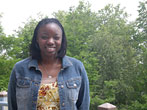 Greetings from the Grand Strand! My name is Aundrea Rue and I teach at Carolina Forest High School in beautiful Myrtle Beach, South Carolina. I have taught physical science, biology, marine science, anatomy, physiology, health, and chemistry over the past five years. In addition to all things nature, I enjoy spending time with my retired racing greyhounds, traveling, and participating in the youth ministries at my church. I am truly looking forward to all of the opportunities that the ARMADA Project presents because I know that what I learn and get excited about will overflow into my teaching, inspiring the next generation of scientists. I can't wait to broaden my horizons and be an example to my students of just how awesome science really is! Greetings from the Grand Strand! My name is Aundrea Rue and I teach at Carolina Forest High School in beautiful Myrtle Beach, South Carolina. I have taught physical science, biology, marine science, anatomy, physiology, health, and chemistry over the past five years. In addition to all things nature, I enjoy spending time with my retired racing greyhounds, traveling, and participating in the youth ministries at my church. I am truly looking forward to all of the opportunities that the ARMADA Project presents because I know that what I learn and get excited about will overflow into my teaching, inspiring the next generation of scientists. I can't wait to broaden my horizons and be an example to my students of just how awesome science really is!
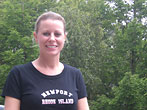 My name is Jacqui Smoler and I teach senior Biology and middle school Science and Mathematics. I have been teaching at St Peter's College, an independent, Anglican boys school in Adelaide, South Australia, for the past seven years and I am the only female science teacher in the school. I have taught for a total of 23 years, 17 of which were in the public education system. I was born in the seaside suburb of Glenelg, in Adelaide, and grew up by the ocean, living only a 10-minute drive from our local beach where I spent many of my childhood summers fishing from our family boat. It was little wonder then that my love of the ocean eventually led me to undertake an Honours degree in Marine Botany, specialising in algal taxonomy and ecology at the University of Adelaide. After a short stint as a tutor to second year university Botany students in my Honours year, I decided that I really loved teaching and so started my career which has never failed to inspire me to learn more and do more in order to improve the learning outcomes of the students that I teach. My name is Jacqui Smoler and I teach senior Biology and middle school Science and Mathematics. I have been teaching at St Peter's College, an independent, Anglican boys school in Adelaide, South Australia, for the past seven years and I am the only female science teacher in the school. I have taught for a total of 23 years, 17 of which were in the public education system. I was born in the seaside suburb of Glenelg, in Adelaide, and grew up by the ocean, living only a 10-minute drive from our local beach where I spent many of my childhood summers fishing from our family boat. It was little wonder then that my love of the ocean eventually led me to undertake an Honours degree in Marine Botany, specialising in algal taxonomy and ecology at the University of Adelaide. After a short stint as a tutor to second year university Botany students in my Honours year, I decided that I really loved teaching and so started my career which has never failed to inspire me to learn more and do more in order to improve the learning outcomes of the students that I teach.
While in the public system I developed and taught a senior Marine Biology course which I ran for six years. At the time it was one of only about three courses of its kind in South Australia and was very popular with the students at my previous school, which was located quite close to the Port Noarlunga reef. My class of 28 students would often visit the reef, which was approximately 200m offshore to conduct quadrat sampling experiments during low tide. I had to check the tide tables constantly to ensure that we could get out to the reef on rubber duckys, which were supplied by the local aquatic centre within our allocated lesson time; this was quite a challenge as you can imagine. This year I am teaching the Diploma Program International Baccalaureate Biology syllabus for the first time, which is very exciting as not many schools in my city teach this course. I plan to teach overseas in the near future in an international school as my husband and I love to travel and experience new cultures.
Earlier this year I was thrilled to win the runner-up position in the Australian BHP Billiton Science Teachers Award for encouraging open-ended investigations with my middle school students. I was lucky enough to win the Reef Research Award in which I will undertake a weeklong trip to Heron Island on the Great Barrier Reef assisting a team of Marine Biologists in their daily work. I am grateful to have been selected as a teacher in the ARMADA program and look forward to spending time learning about the ecology of Rhode Island's coastline in the company of like-minded colleagues. I would also like to thank BHP Billiton for sponsoring my trip to the United States and turning the Armada experience from a dream into an exciting reality. I intend to introduce the boys that I teach to interesting, hands-on learning experiences in which they can gain a greater appreciation and understanding of the importance of our ocean ecosystems.
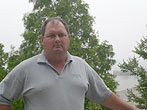 Hi. I'm David Wehunt. I usually go by "Wehunt." I teach environmental science to sophomores, juniors, and seniors at Soddy Daisy High School in beautiful Soddy Daisy, Tennessee, northeast of Chattanooga, both of which are located in Hamilton County. When needed I also teach biology, physical science, and U.S. history. By 2010 I hope to be teaching marine/aquatic science. Besides teaching, I've coached football (middle and high school), basketball (middle and high school) tennis, track, and baseball (all high school), and middle school volleyball. I like to read and fish to relax, and I enjoy boating (pontoon) and occasionally canoeing. Previous extra educational experiences include participating in the 2009 Toyota International Teacher Program, Costa Rica, 2003 Sea Scholars aboard the Mary Sears, Gulf of Mexico, and a participant in many marine and environmental workshops along the coast from the Gulf of Mexico to Maine. Part of my curriculum is teaching my students how to conduct research. I expect the ARMADA Project to increase my knowledge and skills in research practices. I expect to grow professionally and become a better mentor. I also expect to be an asset to the team and actively participate in the Project. Hi. I'm David Wehunt. I usually go by "Wehunt." I teach environmental science to sophomores, juniors, and seniors at Soddy Daisy High School in beautiful Soddy Daisy, Tennessee, northeast of Chattanooga, both of which are located in Hamilton County. When needed I also teach biology, physical science, and U.S. history. By 2010 I hope to be teaching marine/aquatic science. Besides teaching, I've coached football (middle and high school), basketball (middle and high school) tennis, track, and baseball (all high school), and middle school volleyball. I like to read and fish to relax, and I enjoy boating (pontoon) and occasionally canoeing. Previous extra educational experiences include participating in the 2009 Toyota International Teacher Program, Costa Rica, 2003 Sea Scholars aboard the Mary Sears, Gulf of Mexico, and a participant in many marine and environmental workshops along the coast from the Gulf of Mexico to Maine. Part of my curriculum is teaching my students how to conduct research. I expect the ARMADA Project to increase my knowledge and skills in research practices. I expect to grow professionally and become a better mentor. I also expect to be an asset to the team and actively participate in the Project.
|
|




 Hi! I'm Beth Brocato. I have been teaching 7th and 8th grade science at Exeter-West Greenwich Junior High School in West Greenwich, Rhode Island for the past 17 years. I am our school's Improvement Team chairperson and I serve on the district Professional Development Committee. I also spend a few weeks of my summer training teachers on integrating technology into their classrooms through the Rhode Island Teachers and Technology Initiative. I truly enjoy working with adolescents and appreciate all the enthusiasm for learning that they bring to school with them each and every day. I hope my participation in the ARMADA Project will help make some real-world connections for my students as well as to instill my love for life-long learning. Besides teaching, I enjoy traveling with my husband and my daughter, Leah. I also play golf and spend a good part of the summer at the lovely Rhode Island coastline.
Hi! I'm Beth Brocato. I have been teaching 7th and 8th grade science at Exeter-West Greenwich Junior High School in West Greenwich, Rhode Island for the past 17 years. I am our school's Improvement Team chairperson and I serve on the district Professional Development Committee. I also spend a few weeks of my summer training teachers on integrating technology into their classrooms through the Rhode Island Teachers and Technology Initiative. I truly enjoy working with adolescents and appreciate all the enthusiasm for learning that they bring to school with them each and every day. I hope my participation in the ARMADA Project will help make some real-world connections for my students as well as to instill my love for life-long learning. Besides teaching, I enjoy traveling with my husband and my daughter, Leah. I also play golf and spend a good part of the summer at the lovely Rhode Island coastline. My name is Jennifer Duncan and I currently teach marine science at Madeira Beach Middle Fundamental School in St. Petersburg, Florida. This is a marine theme school that is located on the diverse and plentiful Boca Ciega Bay. This gives us the unique ability to perform hands-on on-site skills such as seining, casting, fishing, and plankton tows, to more challenging field collection studies from our docks, mangrove trail, and beach. I fell in love with ocean sailing along the Jersey Shore when I was a little girl. Following my goal to become a marine biologist I received a bachelor's degree at Eckerd College and a master's degree at University of South Florida.
My name is Jennifer Duncan and I currently teach marine science at Madeira Beach Middle Fundamental School in St. Petersburg, Florida. This is a marine theme school that is located on the diverse and plentiful Boca Ciega Bay. This gives us the unique ability to perform hands-on on-site skills such as seining, casting, fishing, and plankton tows, to more challenging field collection studies from our docks, mangrove trail, and beach. I fell in love with ocean sailing along the Jersey Shore when I was a little girl. Following my goal to become a marine biologist I received a bachelor's degree at Eckerd College and a master's degree at University of South Florida. My name is Jennifer Emblidge. I teach science at Marblehead High School in Marblehead, Massachusetts. Currently, I am teaching freshman biology and a marine science elective course. I also coach our school's ocean science team, cross-country running team, and track team. I enjoy working with students because it gives me the opportunity to share, pass on, and develop my passions in life. I have taught for the past five years during which I earned my education degree from Providence College in Rhode Island. Previous to that, I was earning my master's degree in marine biology from the College of Charleston in South Carolina.
My name is Jennifer Emblidge. I teach science at Marblehead High School in Marblehead, Massachusetts. Currently, I am teaching freshman biology and a marine science elective course. I also coach our school's ocean science team, cross-country running team, and track team. I enjoy working with students because it gives me the opportunity to share, pass on, and develop my passions in life. I have taught for the past five years during which I earned my education degree from Providence College in Rhode Island. Previous to that, I was earning my master's degree in marine biology from the College of Charleston in South Carolina. My name is Teresa Gable and I teach life science at the Seneca Falls Middle School in Seneca Falls, New York. I also teach the accelerated science program to the advanced students.
My name is Teresa Gable and I teach life science at the Seneca Falls Middle School in Seneca Falls, New York. I also teach the accelerated science program to the advanced students. My name is Jon Pazol, and I have been a teacher at West Leyden High School in Northlake, Illinois for 20 years. The Leyden School District includes communities that surround O'Hare Airport, and we serve a very diverse student population. I currently teach biology and AP biology, but have a background in chemistry, environmental studies, field ecology, and physics.
My name is Jon Pazol, and I have been a teacher at West Leyden High School in Northlake, Illinois for 20 years. The Leyden School District includes communities that surround O'Hare Airport, and we serve a very diverse student population. I currently teach biology and AP biology, but have a background in chemistry, environmental studies, field ecology, and physics. Hello, I'm Daphne Rawlinson. I have been teaching 3rd - 5th grade science at J. Will Jones Elementary in the Houston Independent School District for the past three years. J. Will Jones is a small public school located in inner-city Houston. We serve a diverse group of at-risk students who have excelled in their academics, and have greatly improved their standardized test scores over the past several years making our school "recognized" by the Texas Education Agency for two consecutive years.
Hello, I'm Daphne Rawlinson. I have been teaching 3rd - 5th grade science at J. Will Jones Elementary in the Houston Independent School District for the past three years. J. Will Jones is a small public school located in inner-city Houston. We serve a diverse group of at-risk students who have excelled in their academics, and have greatly improved their standardized test scores over the past several years making our school "recognized" by the Texas Education Agency for two consecutive years. Greetings from the Grand Strand! My name is Aundrea Rue and I teach at Carolina Forest High School in beautiful Myrtle Beach, South Carolina. I have taught physical science, biology, marine science, anatomy, physiology, health, and chemistry over the past five years. In addition to all things nature, I enjoy spending time with my retired racing greyhounds, traveling, and participating in the youth ministries at my church. I am truly looking forward to all of the opportunities that the ARMADA Project presents because I know that what I learn and get excited about will overflow into my teaching, inspiring the next generation of scientists. I can't wait to broaden my horizons and be an example to my students of just how awesome science really is!
Greetings from the Grand Strand! My name is Aundrea Rue and I teach at Carolina Forest High School in beautiful Myrtle Beach, South Carolina. I have taught physical science, biology, marine science, anatomy, physiology, health, and chemistry over the past five years. In addition to all things nature, I enjoy spending time with my retired racing greyhounds, traveling, and participating in the youth ministries at my church. I am truly looking forward to all of the opportunities that the ARMADA Project presents because I know that what I learn and get excited about will overflow into my teaching, inspiring the next generation of scientists. I can't wait to broaden my horizons and be an example to my students of just how awesome science really is! My name is Jacqui Smoler and I teach senior Biology and middle school Science and Mathematics. I have been teaching at St Peter's College, an independent, Anglican boys school in Adelaide, South Australia, for the past seven years and I am the only female science teacher in the school. I have taught for a total of 23 years, 17 of which were in the public education system. I was born in the seaside suburb of Glenelg, in Adelaide, and grew up by the ocean, living only a 10-minute drive from our local beach where I spent many of my childhood summers fishing from our family boat. It was little wonder then that my love of the ocean eventually led me to undertake an Honours degree in Marine Botany, specialising in algal taxonomy and ecology at the University of Adelaide. After a short stint as a tutor to second year university Botany students in my Honours year, I decided that I really loved teaching and so started my career which has never failed to inspire me to learn more and do more in order to improve the learning outcomes of the students that I teach.
My name is Jacqui Smoler and I teach senior Biology and middle school Science and Mathematics. I have been teaching at St Peter's College, an independent, Anglican boys school in Adelaide, South Australia, for the past seven years and I am the only female science teacher in the school. I have taught for a total of 23 years, 17 of which were in the public education system. I was born in the seaside suburb of Glenelg, in Adelaide, and grew up by the ocean, living only a 10-minute drive from our local beach where I spent many of my childhood summers fishing from our family boat. It was little wonder then that my love of the ocean eventually led me to undertake an Honours degree in Marine Botany, specialising in algal taxonomy and ecology at the University of Adelaide. After a short stint as a tutor to second year university Botany students in my Honours year, I decided that I really loved teaching and so started my career which has never failed to inspire me to learn more and do more in order to improve the learning outcomes of the students that I teach. Hi. I'm David Wehunt. I usually go by "Wehunt." I teach environmental science to sophomores, juniors, and seniors at Soddy Daisy High School in beautiful Soddy Daisy, Tennessee, northeast of Chattanooga, both of which are located in Hamilton County. When needed I also teach biology, physical science, and U.S. history. By 2010 I hope to be teaching marine/aquatic science. Besides teaching, I've coached football (middle and high school), basketball (middle and high school) tennis, track, and baseball (all high school), and middle school volleyball. I like to read and fish to relax, and I enjoy boating (pontoon) and occasionally canoeing. Previous extra educational experiences include participating in the 2009 Toyota International Teacher Program, Costa Rica, 2003 Sea Scholars aboard the Mary Sears, Gulf of Mexico, and a participant in many marine and environmental workshops along the coast from the Gulf of Mexico to Maine. Part of my curriculum is teaching my students how to conduct research. I expect the ARMADA Project to increase my knowledge and skills in research practices. I expect to grow professionally and become a better mentor. I also expect to be an asset to the team and actively participate in the Project.
Hi. I'm David Wehunt. I usually go by "Wehunt." I teach environmental science to sophomores, juniors, and seniors at Soddy Daisy High School in beautiful Soddy Daisy, Tennessee, northeast of Chattanooga, both of which are located in Hamilton County. When needed I also teach biology, physical science, and U.S. history. By 2010 I hope to be teaching marine/aquatic science. Besides teaching, I've coached football (middle and high school), basketball (middle and high school) tennis, track, and baseball (all high school), and middle school volleyball. I like to read and fish to relax, and I enjoy boating (pontoon) and occasionally canoeing. Previous extra educational experiences include participating in the 2009 Toyota International Teacher Program, Costa Rica, 2003 Sea Scholars aboard the Mary Sears, Gulf of Mexico, and a participant in many marine and environmental workshops along the coast from the Gulf of Mexico to Maine. Part of my curriculum is teaching my students how to conduct research. I expect the ARMADA Project to increase my knowledge and skills in research practices. I expect to grow professionally and become a better mentor. I also expect to be an asset to the team and actively participate in the Project.